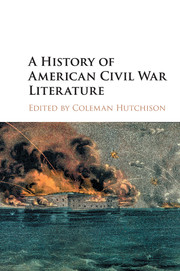Book contents
- Frontmatter
- Dedication
- Contents
- List of Illustrations
- Notes on Contributors
- Preface
- Acknowledgments
- Part I Contexts
- 1 Harriet Beecher Stowe and the “Book That Made This Great War”
- 2 The American Book Trade and the Civil War
- 3 The Transatlantic History of Civil War Literature
- 4 The “American Renaissance” after the American Civil War
- 5 The Realists’ Civil War
- Part II Genres
- Part III Figures
- Recommendations for Further Reading
- Index
4 - The “American Renaissance” after the American Civil War
from Part I - Contexts
Published online by Cambridge University Press: 05 December 2015
- Frontmatter
- Dedication
- Contents
- List of Illustrations
- Notes on Contributors
- Preface
- Acknowledgments
- Part I Contexts
- 1 Harriet Beecher Stowe and the “Book That Made This Great War”
- 2 The American Book Trade and the Civil War
- 3 The Transatlantic History of Civil War Literature
- 4 The “American Renaissance” after the American Civil War
- 5 The Realists’ Civil War
- Part II Genres
- Part III Figures
- Recommendations for Further Reading
- Index
Summary
… the war is a new glass to see all our old things through
– Ralph Waldo EmersonLet us extend one of American history's favorite counterfactual exercises into the literary realm: If the South had won the Civil War, which antebellum authors would we read today? Which authors would we consider the originators of a new literary nationalism? Which would comprise our “American Renaissance”?
The last question refers of course to F. O. Matthiessen's towering American Renaissance: Art and Expression in the Age of Emerson and Whitman (1941), a landmark critical work that almost single-handedly inserted American literature into a twentieth-century university setting and completed a process of national canon formation that had begun in the middle of the nineteenth century. Matthiessen consolidated antebellum literary production into five representative authors – Ralph Waldo Emerson, Henry David Thoreau, Nathaniel Hawthorne, Herman Melville, and Walt Whitman – defending his choice by claiming that “the successive generations of common readers, who make the decisions, would seem finally to have agreed that the authors of the pre-Civil War era who bulk largest in stature are the five who are my subject.” Matthiessen conceded that although other antebellum writers had sold more books and enjoyed greater fame, the five members of his American Renaissance deserved special attention because each exhibited “devotion to the possibilities of democracy.” And despite future efforts by the academy to extend the canon by including women and minority writers, as well as to reformulate what is meant by a literary text, his core group of “important” antebellum authors has remained remarkably durable.
But would that be the case if the South had won the war? American Renaissance begins with an extended study of Emerson because, as Matthiessen observed, not only was Emerson “the cow from which the rest drew their milk” but also “the impulse from Emerson was the most pervasive and far reaching, and … [because] Whitman's extension of many of Emerson's values carried far down into the period after the Civil War.” In a postwar era shaped and dominated by the Confederate States of America, would Emerson's cultural significance have remained so durable?
- Type
- Chapter
- Information
- A History of American Civil War Literature , pp. 48 - 61Publisher: Cambridge University PressPrint publication year: 2015
- 1
- Cited by



